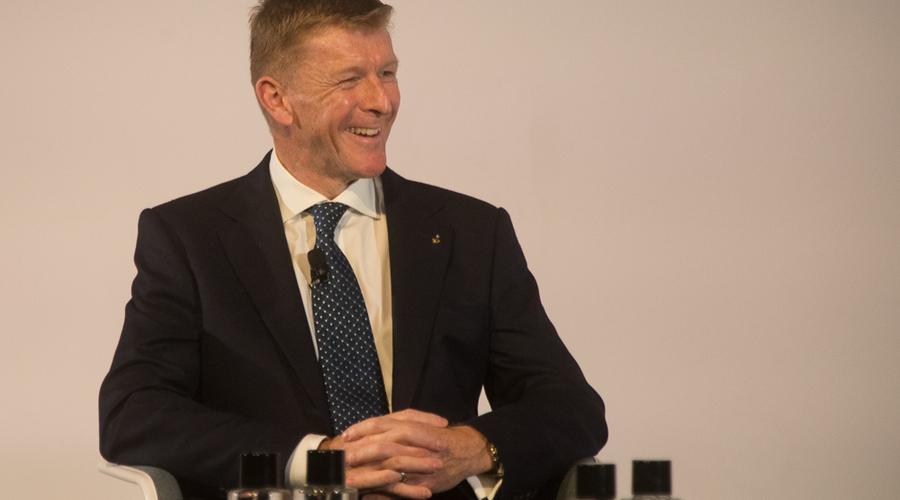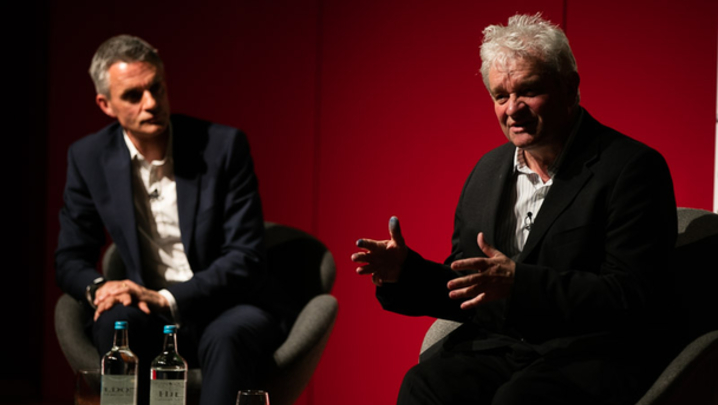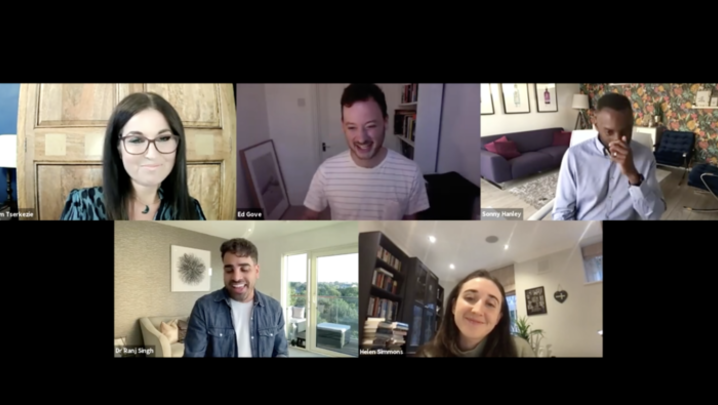Steve Clarke observes a masterclass in communication skills by astronaut Tim Peake
Can you be both macho and metaphysical? Look no further than Tim Peake, the first British person to walk in space and who, in common with many astronauts, was transformed by the experience of spending time in orbit high above Planet Earth.
During a compelling joint RTS-IET Public Lecture, the empathetic Peake showed why soft skills are more important for successful space exploration in the 21st century than the traditional, warrior characteristics famously depicted in The Right Stuff, a portrait of space’s early pioneers, when survival rates were slim.
Yes, the charismatic Peake is a military man who once worked as an Apache helicopter test pilot. He served in Northern Ireland, Bosnia and Afghanistan. But, as anyone knows who has followed his extraordinary mission on the International Space Station (ISS), he is an unusually gifted communicator.
“These days, astronaut selection is shifting from test-pilot qualifications to softer skills such as communication, decision-making, leadership and ‘followship’,” explained Peake, the son of a journalist.
As space missions become ever longer, the need to recruit astronauts who are strong communicators becomes more pressing. Peake spent six months on the ISS, but that long-dreamt-of mission to Mars is certain to take far longer when – and if – it finally happens (see below).

“When we start doing the Mars missions, people will think one year was a short time [to be in space],” he said. “It will be common for astronauts to say, ‘I’ve been up there for three years.’
“As we shift our mission objectives and our strategy, we are shifting our selection criteria. I don’t think it matters so much in terms of whether you are a pilot, a scientist or an engineer: we’ll need a breadth of different skillsets and the soft skills are becoming ever more important.”
He approves of Nasa’s decision, implemented four years ago, to ensure that an equal number of men and women are selected for astronaut training programmes.
Judged by his RTS-IET outing, Peake possesses that unusual skill of being simultaneously modest and authoritative. In other words, just the sort of guy to be holed up with in space for half a year.
Peake’s ability to communicate with all age groups was clear as he was interviewed by BBC Worldwide CEO Tim Davie and answered questions from an entranced audience.
Those present in the auditorium at the IET’s London, Savoy Place HQ – incidentally, one of the capital’s architectural gems – included a government minister (Matt Hancock, the DCMS minister for digital), several children and more than a handful of teenagers and students. Some of them were studying aeronautical engineering.
Asked to account for this ability to convey the complexities of science, engineering and technology to lay people, Peake replied: “I have to make things simple for myself. When someone gives me a complex subject, I need to study it, bring it down and understand how and why it works. That’s how I go about all the topics…. If I try and explain how I understand it, then other people can understand it, too.”
This is a man who not only learnt Russian as part of his journey into space – all the controls on the Soyuz spacecraft that got him to the space station are in Russian – but who also possesses a very human touch.
Should he ever tire of being an astronaut, his skills would translate effortlessly to any organisation in need of a communications strategy makeover.
This ability to connect with and inspire schoolchildren was evident in the “Cosmic Classroom”, in which Major Peake answered live questions while on board the ISS. More than 500,000 youngsters dialled in via a video link.
In 2009, Peake was chosen from more than 9,000 applicants for one of six places on the European Space Agency’s training programme. Was there ever a point in his training when he thought, “I can’t go on with this?”
“Nobody fails the training,” he pointed out. “Once you’re selected for a mission, you’re so committed that you’re going to pass the training. That’s not to say that some areas are not a real struggle. Some people struggle with spacewalk training. It’s really difficult in that suit. It’s really hard work.”
 Despite its challenging nature, Peake said that the one moment he would never forget from his time in space was the spacewalk, “when Tim Kopra [one of Peake’s fellow astronauts] and I were at the furthest edge of the space station”.
Despite its challenging nature, Peake said that the one moment he would never forget from his time in space was the spacewalk, “when Tim Kopra [one of Peake’s fellow astronauts] and I were at the furthest edge of the space station”.
Spacewalks are essential to maintain the ISS. Peake was sent outside to repair an item (a sequential shunt unit) that was crucial to the craft’s power supply.
So what was it like to walk in space? “It’s a bit like rock climbing: you study and analyse the route out there. It’s quite difficult getting all the way out there, past a number of different obstacles.”
Further probing by Davie revealed that Major Peake had just 10 minutes to complete the repair – or risk being electrocuted as the sun rose and activated the craft’s solar panels.
While risk-taking appears to be part of Peake’s DNA, astronauts who carry out spacewalks do have the benefit of a spacesuit covered in 14 layers of various materials to protect them from the environment.
And, in case an astronaut drifts away, small thruster jets housed in their backpack can manoeuvre them back to safety. That, at any rate, is the theory.
“During our training we were exposed to real risk, but the level of risk you feel out on the spacewalk is much, much greater. You are completely at the mercy of your equipment,” explained Peake.
The education programme at the heart of Peake’s mission was something that clearly meant a great deal to him. “That was the main focus. We had no idea how successful this mission was going to be and how people would really embrace it,” he said.
One young boy asked his hero what it was like to exist in zero gravity for so long. “It’s very difficult to describe what zero gravity is like,” admitted Peake. “If you imagine, now, that we were weightless in this room, it would be scary because it’s so big and we would be floating with no handles to hang on to.
“Loads of us would get stuck in the middle of the room. You need to completely readjust your whole way of seeing things.
“But the plus side is: we’re all sitting in this tiny proportion of the room, but imagine if you could use the full volume for things such as storage units and extra seats. That’s what we do on the space station.
“It does take a while to get used to zero gravity. For the first few days on the space station, it is not uncommon for astronauts to get a little bit lost. You come out of a module and everything is upside down. You have to spend a few seconds reorientating your mind.
“What’s amazing about the human brain is how quickly it adapts to that. Before long, your brain can just flip things. It’s very easy for you to be able to work upside down. So you end up coping quite well after just a short period of time.”
Peake told the audience how it had taken around six months for his body to recover following his return to Earth. Despite running the London Marathon in space, albeit on a treadmill, Peake’s bones took time to regain the density lost while in a free-fall environment.
Perhaps the most moving part of Peake’s talk was when he spoke of how the experience of being in space was genuinely life-changing.
“When I first joined the Army, I was studying Russian hardware for when my enemy would come across the North German plain. Then, I’m sitting next to Yuri [on the ISS] thinking, ‘Well, here’s a guy who’s flown Russian jets, who I would have been up against, and here we are as absolute teammates, because we’ve got a common problem.’
You become Earth citizens before you leave… We’re just one corps of astronauts
“It really does give you a different perspective on life… there’s no way you can look at Earth from space and not have an absolutely mind-changing experience of how we need to look after the planet.”
Peake added: “I think that you become Earth citizens before you leave, because you spend so much time training with your colleagues. You forget that you are with someone who is Japanese, Canadian, French, Russian or American.
“We’re just one corps of astronauts. That’s certainly the case on board the space station. There is absolutely no other way to live and work aboard with six people unless you’re completely on the same side.
“You entrust your life to the other people. When we had our docking failure there was very little that we could do to assist Yuri… He was the only one with his hands on the controls. We could try and talk him into the docking cone but he was the one flying the space craft.
“That nearly went wrong but, thankfully, on the second attempt, it was an absolutely textbook docking. You really do put your life in other people’s hands. For that reason, we are one corps of astronauts.”
So, was he itching to return to space? “Absolutely. I’ve never met an astronaut who isn’t.”
‘Life, the universe and beyond, with Tim Peake’ was a joint RTS-IET event held at the IET, Savoy Place, London, on 25 October. The producer was Helen Scott.
Question & answer

Q. Rt Hon Matt Hancock MP, Minister of State for Digital: Why should governments put money into space exploration?
A. Statistically, it’s a good investment. You get a 1.8% return… It terms of technology transfers, it is huge. Then, there’s the pure research taking place on board the space station… research for pharmaceuticals, drugs for osteoporosis, diabetes, Alzheimer’s, Huntingdon’s disease, muscular dystrophy.
The medical community is suddenly realising that micro-gravity is an incredibly valuable area for research.
One of the reasons for this is that we can grow crystals very purely in micro-gravity because there is no convection or segmentation. Growing clear, large protein crystals in space is hugely important to researching drugs and diseases.
Economics, science and medicine aside, if your kids come back from school and say, “Daddy, I spoke to an astronaut today on board the space station”.… The effect of that on a community is very hard to quantify, but [think of] the inspiration that it gives to children and their subsequent careers. They see the opportunities that are available to them.
Peake’s debt to the media
‘We had no idea of what the public and the media would make of this mission,’ said Tim Peake. ‘In the early days, we started off with Blue Peter.
‘It ran two competitions related to the mission, which turned out to be two of the most successful competitions it had ever had.
‘There were thousands and thousands of entries. It was at that point that our eyes began to open and we realised that a lot of people were interested in space exploration. That continued with the BBC Horizon documentary and the fantastic coverage of the launch and the spacewalk. Then, there were Royal Institution Christmas lectures, the “Cosmic Classroom”, running the London Marathon and Channel 4’s Heston’s Dinner in Space.
‘I want to give a huge thanks to the media because all of this would not have been possible without the support we had. This helped us reach out, not only to the young generation and STEM [science, technology, engineering and maths] students, whom we targeted, but to every generation.’
Space travel broadens perspectives
‘There’s this term that people use for astronauts who’ve come back from space – the overview effect,’ revealed Tim Peake. ‘I wouldn’t compare what I did to the Apollo missions, but living for six months in space contributes to this feeling.
‘It’s a cognitive shift in perspective. The fact that you’re able to place the Earth. I feel I know the Earth really well. I’ve seen every part of the Earth 15 times a day in orbit. I really know the terrain, the territory, what places look like – places I’ve never been to and, in some cases, never will go to.
‘But I really know what they look like and I can place everything. You look in the opposite direction, out to space, and you realise just how tiny and fragile Planet Earth is.’
Enemies must collaborate in space
‘There is no way the space station would have been built if it hadn’t had a level of co-operation,’ argued Tim Peake. ‘Consider all the political tensions that there have been between the member states involved in the ISS programme over the past 20 years.
‘While I was training in Russia before launch, we had the Crimea crisis. People were asking, “Is Tim Peake still going ahead with his mission?” Of course I was.
‘The space sector is able to transcend these political divides because each nation knows the end objectives are so important to them.
‘And they will only be achieved with co-operation.’
When will we go to Mars?
‘The next 10 years are going to be really exciting,’ said Tim Peake. ‘We are already building the components that are going to take us beyond the International Space Station.
‘From 2024, it is likely that we will be handing over the ISS to commercial companies.… That will allow the space agencies to focus their resources on the next step – which is the Moon and then Mars.
‘I see public and private investment going hand in hand on many different levels. Space tourism… it’s all good news.
‘The likes of Virgin Galactic and Elon Musk are operating in an incredibly challenging environment. They are pushing technology to the absolute limit and they’re bringing down the cost of access to space.
‘For now, it’s a sport for the rich – but so was aviation in the early 1900s. At some point, it will become affordable to the ordinary person.’
He added: ‘If you think there are challenges in getting to Mars, beyond Mars we’ve really got some challenges.
‘We need to get the journey time to Mars down from eight months to a matter of weeks. We need to shield the astronauts from radiation and provide a habitat for living on Mars. Beyond Mars, we need to improve and develop new propulsion techniques…
‘The ability of humans to live in space for extended periods of time is going to be the main challenge. Maybe, we’ll have people living on Mars permanently.
‘It’s going to happen, but things do take a lot of time. It takes co-operation, resources and funding. But we will get there. These technological problems are not insurmountable.’






